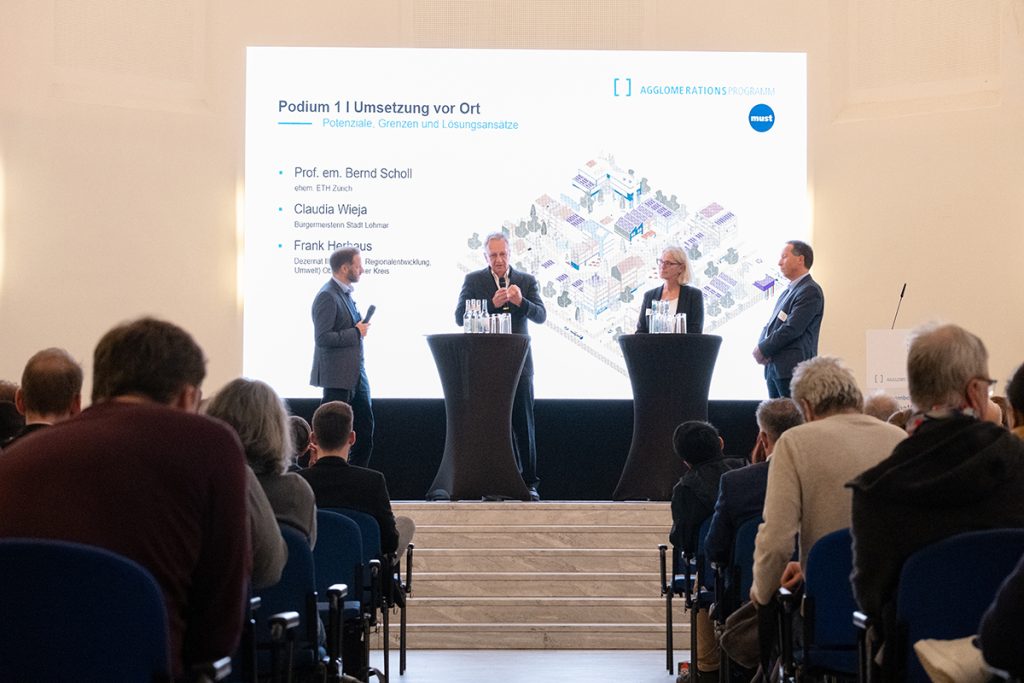On December 17, 2024, the Regional Forum on Multiple Inner Development took place at the Zeughaus Neuss. More than 120 experts from politics, administration, business, and planning came together to address the pressing questions of urban development in the Cologne/Bonn region. The focus was on the four central dimensions of Multiple Inner Development: density and diversity of use, sustainable mobility, blue-green infrastructures, and sustainable energy supply.
Impulses and Workshops with Experts
Following introductory impulses from experts such as Patricia Kraus, transport planner from the city of Bochum, and Peter Küsters from GREENPASS GmbH, participants engaged in interactive workshops. These provided practical insights both through the experts and collegial exchange among participants. Together, concrete questions were tackled, for example: “How can diversity of use be implemented conflict-free in dense urban neighborhoods?” or “Can the ongoing housing demand in the region be a driver for Multiple Inner Development?”
The goal of the workshops was to develop solutions, recommendations, and examples for the challenges of implementing Multiple Inner Development. The content focus was on one of the four dimensions – density and diversity of use, sustainable mobility, blue-green infrastructures, and sustainable energy supply – while also highlighting connections to the other thematic fields. The discussions related to specific neighborhoods, locations, and projects, whereas overarching citywide and regional approaches were reserved for the panel discussions. Different spatial situations, from urban centers to rural areas, were addressed to consider the diverse demands and opportunities of Multiple Inner Development.
Panel Discussions: Implementation Strategies and Perspectives
After the workshops concluded, the panel discussions offered an opportunity to reflect and synthesize the results. Professor Bernd Scholl, who acted as an observer moving between groups during the workshop phase, presented the central findings and placed them in a regional context. Strategic approaches, support needs at various levels (from the whole city to the state level), as well as instruments and funding opportunities were illuminated.
The first panel focused on implementation on site, discussing potentials, limits, and solution approaches. Participants such as Claudia Wieja (Mayor of Lohmar) and Frank Herhaus (Oberbergischer Kreis) brought practical perspectives.
The second panel concentrated on practical experiences, instruments, and strategies at the higher levels of municipality, region, and state. Contributions by Brigitte Scholz (City of Cologne), Regina Rosenstock (Rhein-Sieg District), Christoph van Gemmeren (Ministry for Homeland, Municipal Affairs, Building and Digitization of the State of NRW), and Wilhelm Natrup (former Canton Planner Zurich) particularly addressed questions of quality assurance, funding, as well as communication and acceptance strategies.
The discussions focused on core questions such as: Who sets quality standards? What added values arise from renovating existing structures? How can Multiple Inner Development be effectively communicated to promote transparency and acceptance? The contributions not only provided valuable impulses but also conclusions for local work, which are now to be incorporated into future planning and projects.
Outlook on Next Steps
The event ended with an optimistic outlook on the next steps: Regional and collegial exchange is to be intensified further to learn from one another and develop joint solutions. The development of regional guidelines, which can serve as orientation for the implementation of Multiple Inner Development, as well as the creation of new offers for expert input on specific topics, are planned.
Supporting the concrete implementation of projects remains a central focus. The Regional Forum impressively demonstrated how valuable interdisciplinary dialogue and cooperation among various actors are for shaping future-proof urban development. The practical impulses and open discussion were consistently positively received by participants and opened new perspectives for sustainable and diverse regional development.
The event was an inspiring example of successful knowledge transfer and inter-municipal cooperation. The dialogue will continue to successfully pursue the jointly chosen path.
Source: Köln/Bonn e.V.
